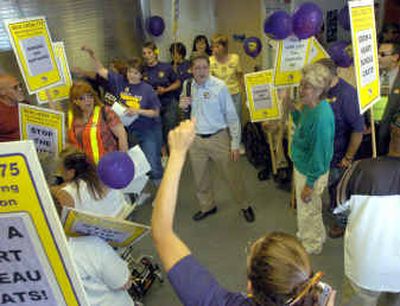Rally shuts down office

Spokane police arrested three people after a rally of home health-care workers briefly forced the shutdown of a state office Thursday. Dozens of protesters gathered inside the offices of the Department of Social and Health Services in north Spokane to rally against cuts to services for elderly and disabled clients. “The worse I get, the less help I get,” said Paul Sheppard, a 75-year-old Spokane man who uses a wheelchair. “And that’s not hardly right.” Sheppard, who was hit by a car two years ago, said the state cut the amount of home care he can receive from 95 hours a month to 69 hours. The state’s 26,000 home care workers, including about 2,500 in the Spokane area, have proved to be effective protesters in the past. Last year, workers rallied in front of the home of Mayor Jim West – then Senate majority leader – after he promised to fight their contract requests. In the end, the workers secured a 50-cents-an-hour pay increase beginning this fall, as well as health benefits that will begin next January. But some protesters allege the state responded by cutting the number of hours they could bill to care for elderly and disabled clients, specifically targeting live-in caregivers. The state currently pays the workers $8.43 an hour to help clean, feed and otherwise care for the clients in their homes. According to protesters, DSHS cut 5 million hours from the current budget, or about 13 percent. A state official in Olympia said a new computer system evaluated the clients and determined how many hours of care they needed. State officials could not say whether the changes will save money or increase costs. “Obviously, we care about getting quality care to people who need it,” said Meagan Macvie, spokeswoman for the state’s Office of Financial Management. “The policies were really intended to provide equitable treatment for clients. The focus was on the needs of the clients, not compensation.” But while the state had few details about the changes, protesters offered their own anecdotal evidence. The rally began on the sidewalks outside DSHS offices at 1427 W. Gardner. Protesters used bullhorns to lead chants, then marched into the parking lot and tossed “dirty” laundry into the buildings’ bushes – a symbol, they said, of the effect the cuts will have on their clients. “Both for our workers and clients, there’s a lot at risk,” said Adam Glickman, spokesman for Local 775 SEIU, the workers’ union. “For clients, it’s about whether they can stay at home or whether they have to go to nursing homes.” The rally quickly attracted notice. State workers pulled a steel gate across the counter at the front desk. A neighbor complained the chants and songs were waking his newborn. “We should be done by noon,” a union organizer told the man, as the crowd behind her chanted, “Union-busting, that’s disgusting. Contract-stalling, that’s appalling.” Police cars slowly began to arrive, first in the parking lot and then pulling into a nearby alley. Michael D. McDonald, 47, powered his wheelchair across the parking lot, chanting and shaking a sign. McDonald, who has muscular dystrophy, said his homecare worker helps him with everything he does, including cooking, medical care and rotating McDonald while he sleeps to prevent sores. “I can’t make it by myself,” McDonald said. Without the care, he said, “I’d probably end up in a nursing home.” By 11 a.m., dozens of people sat in the waiting room of the offices, chanting and singing as volunteers passed out water. After several minutes, Linda Dugger, a program supervisor for DSHS’s Adult Protective Services, arrived to ask the protesters to leave. “I need to let you know you have broken the law by being on state land,” Dugger told the protesters. “We’ve called the police.” Dana Simmons, who cares for a 64-year-old woman with a brain injury, told Dugger they would leave if she would deliver a letter to DSHS Secretary Dennis Braddock, and he would respond. Dugger didn’t budge. “It is not up to me to send the letter to him,” she told the crowd. “It’s your letter.” Outside, police Officer K.J. Busse called for backup. “They’ve taken over the building,” he told reporters. “They’ve effectively closed the public office. If you interfere with the government’s operation, then you’ve committed a crime.” By noon, at least a dozen cops were on scene. When they informed the protesters they had to leave, most gladly headed for the exit after an hour in the hot, cramped offices. Police arrested three protesters who refused to leave, carefully documenting the incident on film. They led the three home care workers – Simmons, Catherine Byrd and Alicia Marks – to waiting patrol cars. Police did not release the protesters’ ages. The other protesters lined the driveway to the offices, cheering for the arrested and chanting. As police drove away, the chants only grew louder.